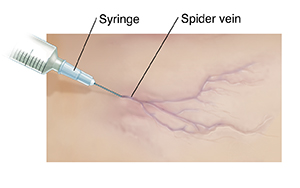A
B
C
D
E
F
G
H
I
J
K
L
M
N
O
P
Q
R
S
T
U
V
W
X
Y
Z
Click a letter to see a list of conditions beginning with that letter.
Click 'Topic Index' to return to the index for the current topic.
Click 'Library Index' to return to the listing of all topics.
Sclerotherapy
The most common way to treat spider and small varicose veins is sclerotherapy. This is a simple office procedure. After treatment, you can return to your daily activities right away. For best results, some veins may need to be treated more than once.
What sclerotherapy does
Sclerotherapy causes spider and small varicose veins to disappear over time. This is done by injecting the veins with a chemical that causes them to scar and collapse. Blood is then rerouted to flow only through the healthy veins. Over time, the treated veins go away. Sclerotherapy will not prevent new spider and varicose veins from forming.
What this treatment involves
Your healthcare provider injects your affected veins using a fine needle. In most cases, this isn’t painful. You may feel a slight burning or stinging. Many veins can be treated in a single session. But some veins may need to be injected more than once. After sclerotherapy, the injection sites are covered with tape and gauze. You may also have to wear bandages or elastic stockings for up to a week.

Recovering at home
At first, your legs will most likely be bruised. For a brief time, they may even look worse than they did before treatment. But don’t worry. You can expect to see good results in 6 to 8 weeks. For the best outcome, here are some helpful hints:
-
Wear elastic stockings or bandages as directed.
-
Elevate your legs as instructed to help reduce swelling.
-
Walk each day to increase blood flow.
-
Follow your healthcare provider’s advice about other kinds of exercise.
When to call your healthcare provider
Call your healthcare provider right away if you notice any of the following:
-
Pain in your legs or feet
-
Bleeding at injection sites
-
Extreme swelling or bruising
-
Fever
-
Chest pain
-
Skin breakdown at the site of the injection
Online Medical Reviewer:
Anne Fetterman RN BSN
Online Medical Reviewer:
Deepak Sudheendra MD
Online Medical Reviewer:
Raymond Kent Turley BSN MSN RN
Date Last Reviewed:
7/1/2022
© 2000-2024 The StayWell Company, LLC. All rights reserved. This information is not intended as a substitute for professional medical care. Always follow your healthcare professional's instructions.